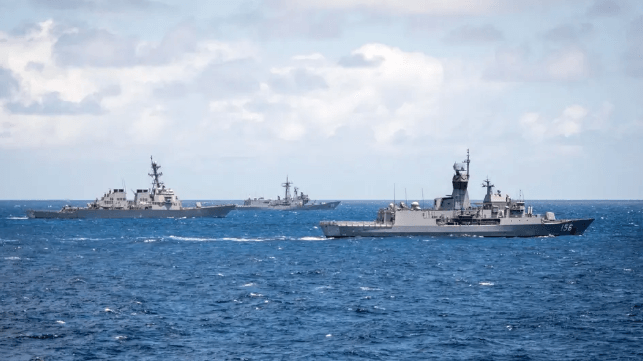China's Sonar Ping Harassment Poses Test of Australia's Will

[By Sam Roggeveen]
China’s harassment of Australian warship HMAS Toowoomba off the coast of Japan, which reportedly caused minor injuries to naval divers attempting to clear a fishing net from the frigate, is the latest in a string of provocations by China’s military against Australian, American, and Canadian ships and aircraft operating in Asian skies and waters. China has repeatedly flouted long-standing conventions that are intended to ensure safety during military intercepts in the air and at sea.
Australia-China relations have improved markedly since the election of the Albanese government, with Prime Minister Anthony Albanese’s recent visit to Beijing marking a new high point. The assertive phase of China’s international behavior, the so-called “Wolf Warrior” era, might be nearing its end, or at least past its peak. But if so, apparently nobody told the PLA – China’s military.
So, the question that arises is whether these incidents are evidence of a clear policy direction, or instead a consequence of poor military command and control combined with inadequate training.
What can Australia do in such cases?
This latest incident recalls a passage in the memoir of Australia’s former prime minister Malcolm Turnbull, A Bigger Picture. Turnbull, who held the top job from 2015–18, justified his decision not to sail Australian naval vessels within 12 nautical miles of China’s artificially constructed islands in the South China Sea, even though Australia did not legally recognize China’s claim to these islands and surrounding waters:
If one of our ships were to be rammed and disabled within the 12-mile limit by a Chinese vessel, we don’t have the capacity to escalate. If the Americans backed us in, then the Chinese would back off. But if Washington hesitated … then China would have achieved an enormous propaganda win.
In other words, Australia could disagree with China on the legality, but without international police to enforce the law, the strongest side generally wins, no matter the legal niceties. Turnbull’s reference to Australia’s “inability to escalate” really meant that, in a test of strength over a legal disagreement, China could bring more to the fight than Australia could. Might makes right.
The Turnbull government calculated that forcing a test of wills only to lose was worse than avoiding such a test. The trouble is, avoiding confrontation implies that you are unwilling to stand by your legal claims, and that hands the initiative to the other side.
The underlying issue raised by Turnbull and reinforced by the HMAS Toowoomba incident concerns the principles and interests that Australia is prepared to make sacrifices for. Successive Australian governments have sincerely claimed to support international law and the rules-based order, both of which China is trying to bend to its will through these incidents. But as the Turnbull passage illustrates, there are limits to the sacrifices Australia is willing to make and risks it is prepared to take to back up such principles. So, China’s provocations serve a clarifying function: they force Australia to clearly define its limits. What kind of behavior will Australia tolerate, and what will it not?
Of course, even if China were to breach those lines, it doesn’t mean Australia should respond directly. A provocation between naval ships or military aircraft does not imply that Australia would need to respond in a tit-for-tat way. Turnbull’s caution still applies – if Australia escalated a military confrontation, Beijing would respond, and would have much more in reserve. The “escalatory ladder” favours China. So, Australia would need to find indirect ways to demonstrate its resolve, whether economic or diplomatic.
A final note on the Turnbull passage, relating to his judgment that “If the Americans backed us in, then the Chinese would back off.” Turnbull’s confidence is, I believe, misplaced. The clarifying function referred to earlier applies to Washington as well as Canberra. When a dangerous intercept occurs, the United States will ask itself: how important is this to us, really? Important enough to go to war over?
Australia should prepare itself for the likelihood that the answer will be a firm “no”.

that matters most
Get the latest maritime news delivered to your inbox daily.
Sam Roggeveen is Director of the Lowy Institute’s International Security Program. Before joining the Lowy Institute, Sam was a senior strategic analyst in Australia’s peak intelligence agency, the Office of National Assessments, where his work dealt mainly with North Asian strategic affairs, including nuclear strategy and Asian military forces.
This article appears courtesy of The Lowy Interpreter and may be found in its original form here.
The opinions expressed herein are the author's and not necessarily those of The Maritime Executive.
